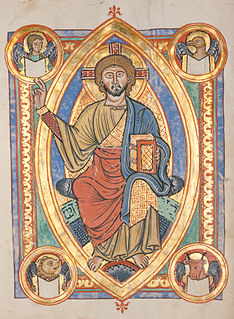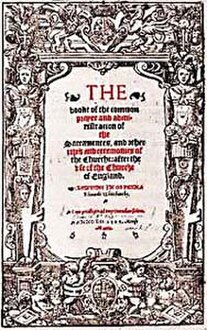
Anointing of the sick, known also by other names, is a form of religious anointing or "unction" for the benefit of a sick person. It is practiced by many Christian churches and denominations.

The Eucharist also known as Holy Communion and the Lord's Supper, among other names, is a Christian rite that is considered a sacrament in most churches, and as an ordinance in others. According to the New Testament, the rite was instituted by Jesus Christ during the Last Supper ; giving his disciples bread and wine during a Passover meal, he commanded them to "do this in memory of me" while referring to the bread as "my body" and the cup of wine as "the blood of my covenant, which is poured out for many".

Mass is the main Eucharistic liturgical service in many forms of Western Christianity. The term Mass is commonly used in the Catholic Church, and in the Western Rite Orthodox, and Old Catholic churches. The term is used in some Lutheran churches, as well as in some Anglican churches. The term is also used, on rare occasion, by other Protestant churches, such as in Methodism.

The epiclesis refers to the invocation of one or several gods. In ancient Greek religion, the epiclesis was the epithet used as the surname given to a deity in religious contexts. The term was borrowed into the Christian tradition, where it designates the part of the Anaphora by which the priest invokes the Holy Spirit upon the Eucharistic bread and wine in some Christian churches. In most Eastern Christian traditions, the Epiclesis comes after the Anamnesis ; in the Western Rite it usually precedes. In the historic practice of the Western Christian Churches, the consecration is effected at the Words of Institution though during the rise of the Liturgical Movement, many denominatons introduced an explicit epiclesis in their liturgies.

Genuflection or genuflexion is the act of bending a knee to the ground, as distinguished from kneeling which more strictly involves both knees. From early times, it has been a gesture of deep respect for a superior. Today, the gesture is common in the Christian religious practices of the Anglican Church, Lutheran Church, Catholic Church, and Western Rite Orthodox Church. The Latin word genuflectio, from which the English word is derived, originally meant kneeling with both knees rather than the rapid dropping to one knee and immediately rising that became customary in Western Europe in the Middle Ages. It is often referred to as "going down on one knee" or "bowing the knee". In Western culture, one genuflects on the left knee to a human dignitary, whether ecclesiastical or civil, while, in Christian churches and chapels, one genuflects on the right knee when the Sacrament is not exposed but in a tabernacle or veiled.
The means of grace in Christian theology are those things through which God gives grace. Just what this grace entails is interpreted in various ways: generally speaking, some see it as God blessing humankind so as to sustain and empower the Christian life; others see it as forgiveness, life, and salvation.
Absolution is a traditional theological term for the forgiveness imparted by ordained Christian priests and experienced by Christian penitents. It is a universal feature of the historic churches of Christendom, although the theology and the practice of absolution vary between denominations.

Eucharistic discipline is the term applied to the regulations and practices associated with an individual preparing for the reception of the Eucharist. Different Christian traditions require varying degrees of preparation, which may include a period of fasting, prayer, repentance, and confession.

Eucharistic theology is a branch of Christian theology which treats doctrines concerning the Holy Eucharist, also commonly known as the Lord's Supper. It exists exclusively in Christianity and related religions, as others generally do not contain a Eucharistic ceremony.

In keeping with its prevailing self-identity as a via media or "middle path" of Western Christianity, Anglican sacramental theology expresses elements in keeping with its status as a church in the catholic tradition and a church of the Reformation. With respect to sacramental theology the Catholic tradition is perhaps most strongly asserted in the importance Anglicanism places on the sacraments as a means of grace, sanctification and forgiveness as expressed in the church's liturgy.

Eucharist here refers to Holy Communion or the Body and Blood of Christ, which is consumed during the Catholic Mass or Eucharistic Celebration. "At the Last Supper, on the night he was betrayed, our Savior instituted the Eucharistic sacrifice of his Body and Blood, ... a memorial of his death and resurrection: a sacrament of love, a sign of unity, a bond of charity, a Paschal banquet 'in which Christ is consumed, the mind is filled with grace, and a pledge of future glory is given to us.'" As such, Eucharist is "an action of thanksgiving to God" derived from "the Jewish blessings that proclaim – especially during a meal – God's works: creation, redemption, and sanctification."

In the Catholic Church, liturgy is divine worship, the proclamation of the Gospel, and active charity.

The Mass is the central liturgical rite in the Catholic Church, encompassing the Liturgy of the Word and the Liturgy of the Eucharist, where the bread and wine are consecrated and become the Body and Blood of Christ. As defined by the Church at the Council of Trent, in the Mass, "the same Christ who offered himself once in a bloody manner on the altar of the cross, is present and offered in an unbloody manner". The Church describes the Mass as the "source and summit of the Christian life". Thus the Church teaches that the Mass is a sacrifice. It teaches that the sacramental bread and wine, through consecration by an ordained priest, become the sacrificial body, blood, soul, and divinity of Christ as the sacrifice on Calvary made truly present once again on the altar. The Catholic Church permits only baptised members in the state of grace to receive Christ in the Eucharist.

The Divine Service is a title given to the Eucharistic liturgy as used in the various Lutheran churches. It has its roots in the Pre-Tridentine Mass as revised by Martin Luther in his Formula missae of 1523 and his Deutsche Messe of 1526. It was further developed through the Kirchenordnungen of the sixteenth and seventeenth centuries that followed in Luther's tradition.
Thanksgiving after Communion is a spiritual practice among Christians who believe in the Real Presence of Jesus Christ in the Communion bread, maintaining themselves in prayer for some time to thank God and especially listening in their hearts for guidance from their Divine guest. This practice was and is highly recommended by saints, theologians, and Doctors of the Church.

Catholic theology is the understanding of Catholic doctrine or teachings, and results from the studies of theologians. It is based on canonical scripture, and sacred tradition, as interpreted authoritatively by the magisterium of the Catholic Church. This article serves as an introduction to various topics in Catholic theology, with links to where fuller coverage is found.
Reparation is a theological concept closely connected with those of atonement and satisfaction. In ascetical theology, reparation is the making of amends for insults given to God through sin, either one's own or another's. The response of man is to be reparation through adoration, prayer, and sacrifice. In Roman Catholic tradition, an act of reparation is a prayer or devotion with the intent to expiate the "sins of others", e.g. for the repair of the sin of blasphemy, the sufferings of Jesus Christ or as Acts of Reparation to the Virgin Mary.

The Roman Catholic tradition includes a number of devotions to Jesus Christ. Like all Catholic devotions, these prayer forms are not part of the official public liturgy of the Church but are based on the popular spiritual practices of Roman Catholics. Many are officially approved by the Holy See as suitable for spiritual growth but not necessary for salvation.

Spiritual communion is a Christian practice of desiring union with Jesus Christ in the Eucharist. It is used as a preparation for Mass and by individuals who cannot receive Holy Communion.

The 1549 edition of the Book of Common Prayer is the original version of the Book of Common Prayer (BCP), variations of which are still in use as the official liturgical book of the Church of England and other Anglican churches. Written during the English Reformation, the prayer book was largely the work of Thomas Cranmer, who borrowed from a large number of other sources. Evidence of Cranmer's Protestant theology can be seen throughout the book; however, the services maintain the traditional forms and sacramental language inherited from medieval Catholic liturgies. Criticised by Protestants for being too traditional, it was replaced by a new and significantly revised edition in 1552.











